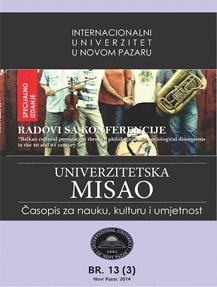BORROWINGS IN THE ENGLISH LANGUAGE – HOW THE ROMAN, ANGLO-SAXON AND NORMAN INVASIONS OF THE BRITISH ISLES IMPACTED THE MODERN ENGLISH
BORROWINGS IN THE ENGLISH LANGUAGE – HOW THE ROMAN, ANGLO-SAXON AND NORMAN INVASIONS OF THE BRITISH ISLES IMPACTED THE MODERN ENGLISH
Author(s): Aldin RasticSubject(s): Lexis, Semantics, Comparative Linguistics, Sociolinguistics, Philology
Published by: Интернационални Универзитет у Новом Пазару
Keywords: borrowing; Roman; Anglo-Saxon; Norman; doublet; invasions; etymology;
Summary/Abstract: Borrowed words, sometimes called loanwords or just borrowings, are words taken from other languages which serve as a reminder about how the English language came into contact with other nations and cultures. Borrowings are in most cases related to different invasions and can be traced back to their original form and use, e.g. Latin words castra or castrum were used by the Romans to mean a place where a military fort was to be built and today there are many places in Britain which have -chester preserved in their name from these two Latin words. The British Isles have always been of great interest for various invaders. The Romans invaded because the soil was good, food was plentiful and there were many people to enslave; some historians claim that the Anglo-Saxons came to Britain because they were invited to come and protect the southern parts from the tribes which were at that time located in the north while others claim that the lands they initially occupied often flooded and they sought new land to settle down. There were also the Normans and their massive influence on the English language as most borrowed words that we use presently are taken from the French language Normans spoke. Thus, we have many so-called doublets of etymological twins, e.g. ward and guardor royal and kingly.
Journal: Univerzitetska misao
- Issue Year: 2014
- Issue No: 13 (3)
- Page Range: 194-207
- Page Count: 14
- Language: English

